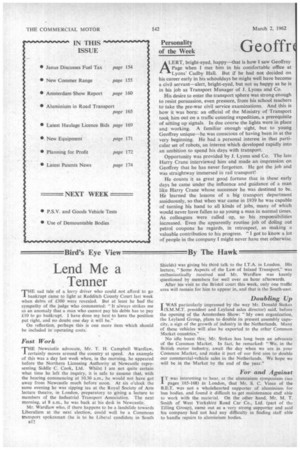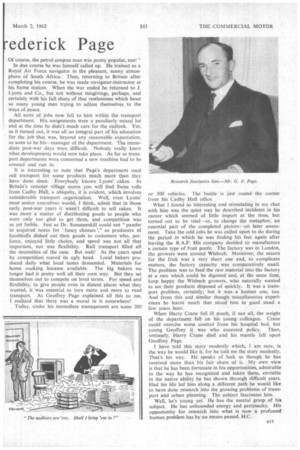Geoffr
Page 48

Page 49

If you've noticed an error in this article please click here to report it so we can fix it.
ALERT, bright-eyed, happy—that is how I saw Geoffrey Page when I met him in his comfortable office at Lyons' Cadby Hall. But if he had not decided on his career early in his schooldays he might well have become a civil servant—alert, bright-eyed, but not as happy as he is in his job as Transport Manager of J. Lyons and Co.
His desire to enter the transport sphere was strong enough to resist persuasion, even pressure, from his school teachers to take the pre-war civil service examinations. And this is how it was born: an official of the Ministry of Transport took him out on a traffic counting expedition, a prerequisite of setting up signals. In due course the lights were in place and working. A familiar enough sight, but to young Geoffrey unique—he was conscious of having been in at the very beginning. He had a personal interest in that particular set of robots, an interest which developed rapidly into an ambition to spend his days with transport.
Opportunity was provided by J. Lyons and Co. The late Harry Crane interviewed him and made an impression on Geoffrey that he has never forgotten. He got the job and was straightway immersed in rail transport!
He counts it as great good fortune that in these early days he came under the influence and guidance of a man like Harry Crane whose successor he was destined to be. He learned the lessons of a big transport department assiduously, so that when war came in 1939 he was capable of turning his hand to all kinds of jobs, many of which would never have fallen to so young a man in normal times. As colleagues were called up, so his responsibilities increased. Even the apparently routine job of doling out petrol coupons he regards, in retrospect, as making a valuable contribution to his progress. "I got to know a lot of people in the company I might never have met otherwise.
Of course, the petrol coupon man was pretty popular, too!"
In due course he was himself called up. He trained as a Royal Air Force navigator in the pleasant, sunny atmosphere of South Africa. Then, returning to Britain after completing his course,' he was made navigator-instructor at his home station. When the war ended he returned to I. Lyons and Co., but not without misgivings, perhaps, and certainly with his full share of that restlessness which beset so many young men trying to adjust themselves to the ways of peace. .
All sorts of jobs now fell to him within the transport department. His• assignments were a peculiarly mixed lot and at the time he didn't much care for the outlook. Yet, as it turned out, it was all an integral part of his education for the job that was, beyond any reasonable expectation, so soon to be his—manager of the department. The immediate post-war days were difficult. Nobody really knew what developments would now take place, As far as transport departments were concerned a new machine had to be created and run in.
It is interesting to note that Page's department used rail transport for some products much more than they have done since. Everybody knows Lyons' cakes. In Britain's remoter village stores you will find Swiss rolls from Cadby Hall, a ubiquity, it is evident, which involves considerable transport organization. Well, even Lyons' most senior executives would, I think, admit that in those early, post-war years it wasn't difficult to sell cakes. It was more a matter of distributing goods to people who were only too glad to get them, and competition was as yet feeble. Just as Dr. Summerskill could not "pander to acquired tastes for 'fancy cheeses '," so producers of foodstuffs dished out their goods to customers who, perforce, enjoyed little choice, and speed was not all that important, nor was flexibility. Rail transport filled all the necessities of the case. But wait! As the years sped by competition reared its ugly head. Local bakers produced daily what local tastes demanded. Materials for home cooking became available. The big bakers no longer had it pretty well all their 'own way. But they set themselves out to compete on level terms. For speed and flexibility, to give people even in distant places what they wanted, it was essential to turn more and more to road transport. As Geoffrey Page explained all this .to me, I realized that there was a moral in it somewhere!
Today, under his immediate management are some 200 or 300 vehicles. The bustle is just round the corner from his Cadby Hall office.
What I found so interesting and stimulating in my chat with him was the quiet way he described incidents in his career which seemed of little import at the time, but turned out to be vital—or, to change the metaphor, an essential part of the completed picture—on later assessment. Take the odd jobs he .was called upon to do during the period in which he was finding his feet again after leaving the R.A.F. His company decided to manufacture a Certain type of fruit purée. The factory was in London, the growers were around • Wisbech. Moreover, the season for the fruit was a very short one and, to complicate matters, the factory capacity was comparatively small. The problem was to feed the raw material into the factory at a rate which could be digested and, at the same time, keep happy the Wisbech growers, who naturally wanted to see their products disposed of quickly. It was a transport problem, certainly; but it was a human one, too. And from this and similar though miscellaneous experiences he learnt mulch that stood him in good ,stead a few years later:
When Harry Crane fell ill much, if not all, the weight of the department fell on his young colleague. Crane could exorcise some control from his hospital bed, but young Geoffrey it was who executed. policy. Then, untimely, Harry Crane died and his mantle fell upon Geoffrey Page.
have told this story modestly which, I am sure, is the way he would like it, for he 'told me the story modestly. That's his way. He speaks of luck as though he has received more than his fair share of it. My own view is that he has been fortunate in his opportunities, admirable in the way he has recognized and taken them, enviable in the native ability he has shown through difficult years. Had his life led him along a different path he would like to have done research into the growing problems of transport and urban planning. The subject fascinates him.
Welt, he's young yet. He has the mental grasp of his subject. He has unbounded energy and pertinacity. His opportunity for research into what is now a profound human problem has by no means passed. H.C.




















































































































































